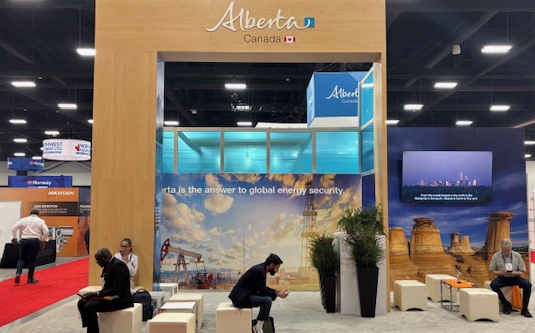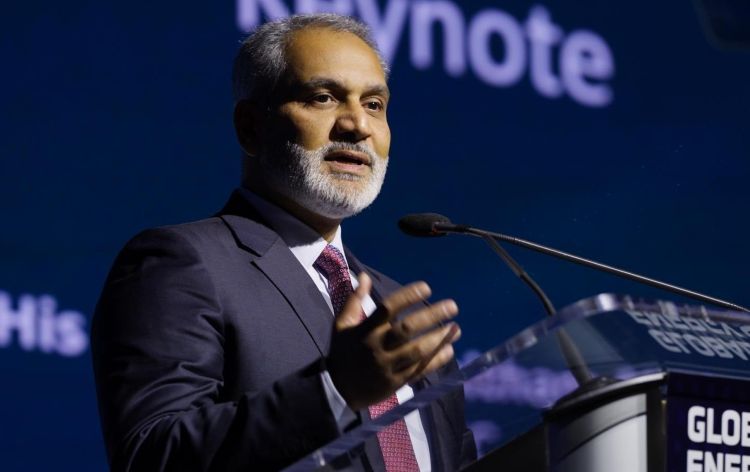
By Ernest Granson
The Calgary Global Energy Show (formerly the Calgary Global Petroleum Show) is a staple event for the energy industry in Western Canada with its 56th edition having taken place in June 2025. It attracts more than 30,000 attendees each year from around the world. It’s just one of numerous global conferences and events produced by dmg events, headquartered in London.

The 2025 edition featured a keynote speech given by HE Haitham Al Ghais, OPEC Secretary General (SG), who delivered a strongly worded message announcing that, “there is "no peak in oil demand on the horizon.” In fact, stated the SG, “primary global energy demand is expected to rise by 24% between now and 2050, driven by population growth, urbanization, and economic expansion. This will require an estimated $17.4 trillion in investment in the oil sector during that period.” Al Ghais concluded his address by praising those involved in the oil and gas industry, and urging them to be proud of their efforts for being innovative and for helping to raise the global standard of living.
For the dmg’s Energy Show, this past edition might be considered somewhat of a high point, following more than ten years of uncertainty for the oil and gas sector. Business Edge’s Senior Editor Ernest Granson spoke with dmg event’s Senior Vice President Nick Samain, about show’s journey through past decade.

BE: Nick, the Calgary Global Energy Show has gone through the peaks and valleys right along with the energy industry over the decades, and you, having come on board with dmg events in 2014 must have gotten a taste of not just the peaks, but also those valleys, for example, as the 2014 oil and gas downturn created a dramatic effect on the industry, and with the pandemic era as well, What were the experiences like for you and all the parties involved with the energy show during those stressful times?
NS: The 2014 show was a record breaker for us, both in size and number of participants, and the sector here was just hopping. I think, in retrospect, it felt as though this can't end, and we're just going to see unbridled growth. Of course, that's not what happened. There was a big downturn, and let me put it this way, it’s certainly one way to learn the sector from top to bottom. During that year and the subsequent difficult years of operating Canada's largest energy event there were plenty of challenges, but we learned a tremendous amount, which has really helped us to cement what we felt an all-new event should be about in these more current times.
BE: The name of the energy show changed from the Global Petroleum Show to the Global Energy show back in 2020, That seemed to be a fundamental change. What was the discussion like when that rebranding was put forward? What were the reactions from those long-time energy show partners? And also, what does it tell us about the changes in what we used to call the oil and gas industry?
NS: Yes, there are several aspects to that. One was the obvious one which you pointed out, which was to change the brand to the word “energy” because in the subsequent years since that downturn there was a tremendous amount of growth in areas like renewables, clean energy, new energy, but also that integration of different types of energy along with supporting oil and gas. We had all of those things at play. It’s also important to keep in mind, that much of the investment coming into sustainable energy was coming from and continues to come from the oil and gas sector. We saw that all of that converging and were one of the first big events to really broaden out our view. In this space, there’s been a tendency for an “us versus them” or “them versus us”, but we’re really at that point now where we realize that no single source of energy can meet the world's needs, and that's what the show is really striving to represent.
BE: The 2025 show included several big issues that form the Executive Conference program part of the show. Here are the titles of three of those discussions: 1.) Is Canada's energy story at a crossroads, or the inflection point? 2.) US - Canada relations, North America's energy future, and 3.) How can Canada create its own national identity in the energy sector. They're obviously all closely related. But who develops these themes or focal points for the energy show, and how did you arrive at these particular topics to tackle?
NS: Shortly after the downturn we started to rebuild the show. One of the first things we did was to reach out to build an executive committee. It was important that this would be a committee with a broad base of experience, that it would be diverse and that its members would be both domestic and international. It really comes from challenging how we operate this event from a day-after approach. When we had our first committee meeting for the 2025 event almost a year ago in July we knew there was going to be a US election and we knew there was going to be a Canadian election coming up but there were certainly plenty of things that we couldn’t predict such as what we're currently seeing in the news, whether it’s tariffs or other world events. We knew it was going to be a time of change. But it's also a tremendous opportunity to look ahead to address many of the challenges for the domestic sector. And those challenges could be building more infrastructure such as LNG or transporting more energy to tide water or bringing the energy from where it's located in Alberta to consumers in different parts of Canada in a more cost effective and reliable manner or diversifying Canada's customer base to more countries that are looking for clean, affordable and reliable energy.
Those were the macro issues that the committee considered as the members began to put this year’s programs in place. We did have some of those issues taking place already at that time but as it stands now, because of two big events with the new U.S. administration and its actions, we’re now passing though more unusual times, unprojected times for us. So, yes it's been an unusual year, but also an exciting year and we've really been seeing the results of that come in now with a growth of the trade show, because we do believe there is a real sense that the sector's getting together and planning for what that infrastructure could look like. Whether you're a business, an investor or a policy maker, it’s important to be around for that largest gathering of the energy sector.
BE: You have brought in a new conference component as well. It's called Energy Influencers. The three themes you selected were 1.) The next frontier in oil and gas, 2.) New energy, and 3.) AI and digitalization. It seems you have had to significantly broaden the types of technology in the business areas as you just previously mentioned. Are we operating in a new age of energy production, where sectors can't be distinctly or cleanly separated?
NS: I think we are to a great extent, Ernest. In particular, when it comes to AI. It's tough to find a conference that's not talking about AI and digital in general, and I think there's a good reason for that. It's multifaceted in the energy sector because AI can optimize and do all kinds of amazing things from an energy technology standpoint.
BE: What was the reaction from those people who are now participants in this digital technology component that you've included? Were they skeptical? Were they excited? Was this part of the show that really spoke to them?
NS: Yes, it really spoke to them because digitization in oil and gas and energy has actually been around a long time. In fact, that's where so many of new advancements that are industry transferable between the energy sector and, let's say, the automotive or aerospace or AgTech originate. There's a tremendous widespread community that has already participated at the Global Energy Show but there really hasn't been a home gathering to focus in on what energy and digitalization and AI means. For instance, what are the investment pathways? What are the educational and human resource needs that are going to be upcoming in the next five years, because there are some very competitive markets right now going on to see if Canada can be a global leader in that sphere.
BE: Finally, Nick, what do you see as far as future trends or directions into which the energy industry is moving that trade show/conferences/gatherings you have to consider for future events?
NS: At dmg, we're fortunate to operate some of the world's largest energy events, including the largest in the world, ADIPEC (Abu Dhabi International Petroleum Exhibition and Conference) which happens in Abu Dhabi every November, Gastech (September 2025 in Milan, Italy), India Energy Week (January 2026 in Goa, India), and others. The trend that we are seeing and where we're finding success is that the big events are getting bigger. People have less time. There are plenty of ways to connect digitally, and we have our own energy connections, portal and otherwise digitally, but getting together, face to face is becoming more important.
But delegates are also becoming more particular to which conference that they want to commit. We're seeing that in their budgets, whether they decide to go to Calgary in June, or Las Vegas or New York or Milan. They need to be able to pick and choose and so many delegates are really closely reviewing potential events. From a trend standpoint, they want to make sure they are receiving premium value day in and day out. They don't necessarily want to spend all day in a conference room absorbing tons of information. They also believe in the value of networking. Who's going to be there, who am I going to bump into, is so much more important. We tripled the amount of networking possibilities this year in the Global Energy Show in response to that.
To encourage that networking, especially for our younger energy industry participants, we’ve brought in activities such as the big centre court in the exhibit hall where you shoot basketballs. There’s a 24-hour latte lounge open. There are places where you can plug in and get some work done. There are three session theatres where the content is being recorded so you can hang out any one of the theatres and not miss anything. You can network with fellow energy influencers through the app, set up meetings off site. It’s really taking the traditional conference model and turning it on its end.
Probably what I'm most excited about is that you can take our newly created conferences like the Executive Conference, which discusses some of the heavy issues of the day by significant speakers such as the CEO of major corporations and then the Energy Influencers, with its diverse mix of participants, put them together at the end of the day networking and see what happens. We're quite excited about that cross pollination of ideas, of diversity. That's what energy is all about, and where those breakthroughs are rooted.
Those are some of the trends that we're seeing and that is what we led into with our investments in this year's edition.
BE: Nick, thanks so much for taking us inside one of the major global energy showcases, the Calgary Global Energy show, and describing how its many elements are created.